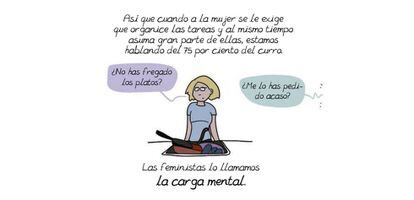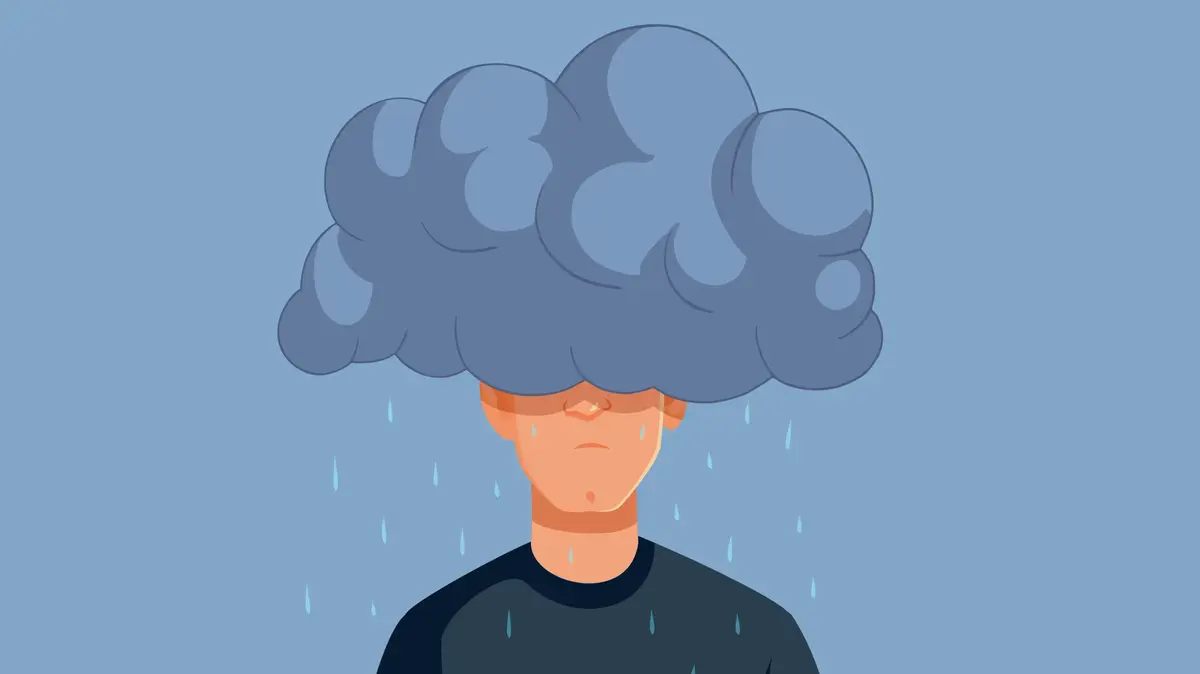Rosario Torres says "yes", that she is "enough to stop or think".
At 52 years old, two daughters “already grown” but still under her roof, two dogs “of which they fell in love a year before the pandemic”, and her husband working half the day —“12 hours, literally”—, “ how does anyone believe” that she can have “a single minute”.
What she does have are two cleaning jobs and she eats on the way from one to the other: "Actually I have four: the two that pay me, the house and the dogs."
Rosario doesn't know what it's like to have a little time for herself, "not to mention lazing around."
What if she left some of her chores one day to do it the next?
"What I do every day has to be done every day because nobody else is going to do it and, if not, I would be accumulating until the day I don't even sleep."
This woman who came to Spain from Ecuador more than a decade ago is one of many others who are practically unaware of what free time is and stick to the dictum of “don't leave for tomorrow what you can do today”.
That, having time to do nothing or the ability to leave something pending, depends on different socioeconomic, cultural and family variables such as place of residence, employment, whether or not you have a partner or whether or not you have children.
But, be that as it may, they usually lack more hours due to the frequent role of workers and caregivers.
In 2019, the ClosinGap study
Opportunity cost of the gender gap in leisure
estimated 11.1 million hours of leisure per day less than women had compared to men, one hour and 37 minutes per Spaniard;
something that increases, for example, in the rural world, where compared to them, women dedicate two hours and seven minutes more a day to home and family.
That is, two hours and seven minutes less of being able to do nothing.
Laura Sagnier, an economist and expert in
big data
and
market intelligence
who spent almost two years analyzing what women in Spain think, feel and are doing (
Las Mujeres Hoy
, Deusto, 2018), remembers the “free” hours that accounted for what women had depending on each vital situation, what she called “fronts”: children, partners, work.
“With no front, four hours and 18 minutes.
If they only live as a couple, five hours and six minutes.
If they only have children, four hours and 18 minutes.
If they only have paid work, three hours and 36 minutes.
If they live as a couple and have children, three hours and 18 minutes.
If they live as a couple and have paid work, three hours and 24 minutes.
If they have paid work and children, two and a half hours.
And if they have all the fronts, one hour and 54 minutes”, he collects.
It is the double shift —paid and unpaid work, domestic work—, the so-called mental load —the mental effort of daily organization to which women are subjected inside and outside of work—, and also the self-demand, especially in the labor, derived from stereotypes and the gender gap: they redouble efforts to achieve the same goals as men, to demonstrate the same skills and, sometimes, not to burden the rest of the team with a job that they
can
take on.
One of the vignettes from the book 'The mental load' (Lumen, 2018), by Emma Clit.
The way in which society is structured makes women develop in a world in which time for them usually counts, if possible, more than for the rest.
And it probably contributes to the fact that they are the ones who suffer the most stress, anxiety, depression and emotional problems, also the ones who take the most medication.
And the older the age, the greater the difference in consumption between the sexes, until reaching those over 65 years of age.
According to the 2017 National Health Survey (the last one carried out), 34.1% of women over that age (65) had taken tranquilizers in the previous two weeks, compared to 15.4% of men .
“Some authors indicate that greater job instability plays an important role.
Others point to the greater willingness of women to express their symptoms and seek medical attention compared to men, ”explained María Isabel Santos Pérez, author of a study on the matter, to EL PAÍS.
Quim Limonero, professor of psychology at the Autonomous University of Barcelona, points out that responsibility and compliance with the rules are usually more present in the personality traits of women, influenced by a culture that has traditionally entrusted them with more tasks and care than to men.
"This can affect mental pathology when caring for others affects abandoning activities that are rewarding for them, something that tends to happen more than among men, although it is something that also changes, depending on the society," he points out.
Rosario lives “overwhelmed, with her tongue hanging out”, and with a benzodiazepine prescription for seven years.
And Amelia, who is trying to make a place for herself in the world of law and prefers not to give her last name for “professional reasons”, has been taking them for three years, when she turned 31: “I started not being able to sleep and feeling like I was dizzy all the time. day".
She went two months after entering the law firm where she still works: “In my world you either wise up or they eat you, if you're young and obviously if you're an aunt, more so.
I work hours like crazy and I'm always available”.
That yes, she does not have children or any other burden, although "the thing of being able to say any day, come on, I'm going to the cinema or to dinner or to a terrace, that has been practically reduced to zero".
Work, more work, little or no time, stress, anxiety, medication.
Just being a woman is already considered a risk factor for mental health problems.
Several studies show that the probability of suffering from them is around 20% for women, almost double that for men.
The causes of this are both biological and social.
And, as in many health problems, it is the interaction between the two that makes certain disorders emerge or not.
More information
Mental health, the great challenge of today's society
At a Lundbeck Pharmaceutical Women's Mental Health seminar last spring, experts discussed these phenomena.
They agreed in attributing an important role to the biological part, which is propitiated by hormones.
As explained by Marina Díaz Marsá, president of the Madrid Psychiatric Society and head of Psychiatry at the San Carlos Clinical Hospital, alterations can be observed that have to do with estrogen and the reproductive cycle, which manifest themselves in adolescence, postpartum, perimenopause and menopause.
But these are only factors that complement the social ones: “From 45 to 55 years old there is a significant vital overload, it is the age of greatest labor demand, with many physical and mental changes and for this reason it is the worst period in terms of this problem and when greater depression can be had”.
A study published in 2019 in
Gaceta Sanitaria
concluded that gender, social class, family roles, and work performed outside and within the home and family environment can be a source of inequalities in mental health.
The caregiver role often contributes to problems at this level.
“When a woman presents anxiety, prolonged insomnia, irritability or blames herself for going to work instead of taking care of the children, it is not usually considered that she has a pathology.
In general, she goes to the psychiatrist or the doctor late, she usually waits until the solution becomes more difficult.
People tend to ignore that they are mental health problems, that they are illnesses that have treatment”, recognized Ana González-Pinto, president of the Spanish Foundation for Psychiatry and Mental Health in an interview in
El Médico Interactivo
.
Power with everything also steals time, and health
Women are, however, more resilient to these problems, points out Javier Olivera Pueyo, psychiatrist in charge of the Psychogeriatrics and Psychosomatic Medicine Program at the San Jorge de Huesca University Hospital: despite having more mental health problems, they commit suicide much less than men, for example.
And that resilience to which Olivera refers, also occurs in the workplace.
And it's not always positive.
That “I can” sometimes leads to a self-imposed work overload, albeit vitiated by gender stereotypes, which is detrimental both in the short and long term.
In research published in 2021 from The Ohio State University Fisher College of Business in conjunction with Harvard Business School, one of the experiments was one that one of the study's co-authors, Grant Donnelly, did in his class.
He asked 103 students for a paper worth 20% of their grade in an undergraduate business course.
Everyone was given a week to submit it and was told that if they requested it by email, they could ask for a one-week extension.
36% of them and 15% of them did.
The one who corrected the works later was another professor, who did not know who they were or who had requested that postponement.
The result was that those who had requested the extension did a better job.
“It was his [the women's] concern about overloading his team and manager with more work that most predicted the women's discomfort with asking for more time.
Perceived burden and emotions such as shame and guilt explained why women experienced more discomfort asking for extensions than men,” Donnelly explains via email.
The results of her research show that in this specific area, "women should ask for more time" when needed.
They generally don't “because they worry about being seen as incompetent or unable to do their jobs effectively, but this concern is overstated.
Asking for more time reduces burnout and allows women to produce higher quality work.”
Women are more concerned with being a burden to others, being good teammates, tend to be more sensitive to other people's needs compared to men
Grant Donnelly
That research, which involved nine studies with more than 5,000 participants, including online panels of working adults and college students, concluded that "the feeling of having too much to do and not enough time to do it is a social epidemic that compromises the productivity, physical health and emotional well-being” for anyone, yes, but that both their analysis and “previous research shows that women experience proportionally more temporary distress than men”.
In part, the responsibility for “increased burnout and stress in the workplace” lies with empathy.
They are more relationship-oriented: “More concerned with being a burden to others, being good teammates, they tend to be more sensitive to other people's needs compared to men.
They sacrifice their own to attend to those of others, both voluntarily and in response to social pressure.
They are "very good characteristics to be a colleague, but it comes at a cost to them, it undermines their well-being and also their performance."
Amelia, the lawyer, is "aware" that she should "try" to find more time, not only for herself: "For my family, my friends, my social life is almost zero until the holidays arrive."
Rosario no, what Rosario would like is just to have time alone and exclusively for her: "To be able to be lazy from time to time... Look, yes, that everyone would take care of themselves and I would only take care of myself and be able to say even if only outside once a week "I'll do this tomorrow".









